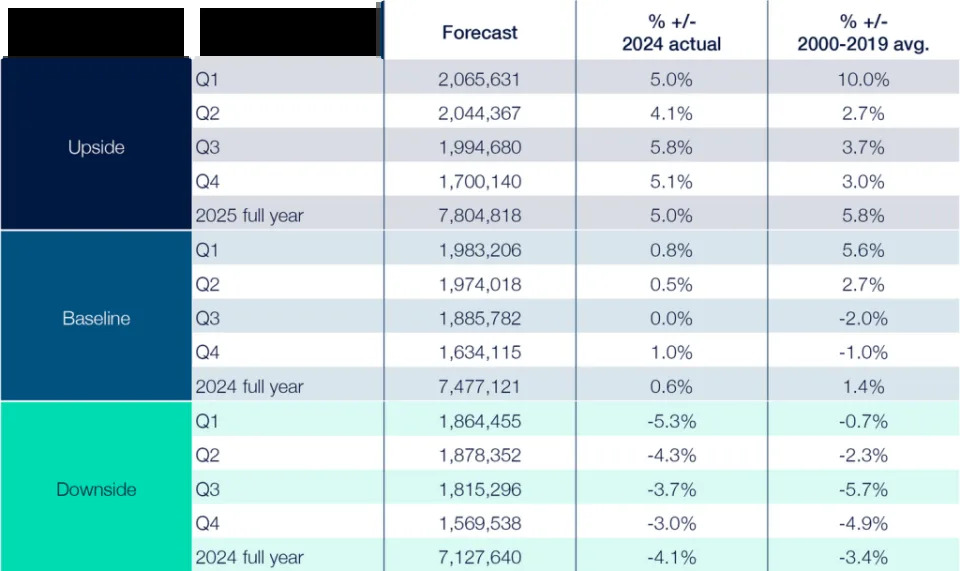The UK’s used car market is projected to experience only modest growth in the coming years, with transactions rising from 7.4 million in 2024 to just under 7.9 million by 2027, according to Cox Automotive’s latest analysis.
Baseline projections for 2025, featured in Cox Automotive’s Insight Quarterly (IQ) report, estimate 7,458,356 used car transactions—a mere 0.3% increase from 2024 levels. This sluggish growth reflects a market still grappling with economic pressures and supply challenges, far removed from pre-pandemic activity. Cox Automotive reports high forecasting accuracy for 2024, with baseline projections tracking at 96.7% and 99.6% for its upside forecast through Q3.

“Demand for used vehicles remains stable, but the UK car parc is contracting, and overall vehicle registrations and transactions continue to fall short of peak levels seen from 2002-2008 and 2014-2019,” said Philip Nothard, Insight Director at Cox Automotive.
The used car market faces an evolving landscape shaped by the rising prominence of new energy vehicles (NEVs) and shifting production priorities among original equipment manufacturers (OEMs). As OEMs focus on NEVs, traditional internal combustion engine (ICE) vehicles are expected to decline in availability.
While the adoption of battery electric vehicles (BEVs) in the used market is accelerating, challenges remain. Early adopter dealerships report certain EV models holding value and selling faster than ICE counterparts. BEVs are projected to increase their share of used car transactions by over 50% in early 2024. By 2027, BEVs are expected to represent 34% of used car transactions, up from 21% in 2024. However, ICE vehicles remain dominant due to consumer concerns about EV charging infrastructure and affordability.
Economic factors also weigh heavily on the sector. Although modest interest rate reductions are anticipated, inflation remains above historical norms, limiting consumer purchasing power. Affordability will likely drive consumer decisions, with used cars seen as a cost-effective alternative to new vehicles.
“Our data suggest economic pressures will continue to influence consumer behaviour,” said Nothard. “While new car prices rise, strong demand for lower-cost alternatives will keep used car sales steady. With ongoing supply constraints and a shrinking car parc, vehicle values for certain in-demand segments, particularly ICE, are expected to remain high.”
The UK’s car parc is forecast to decline by around 4.47% over the next three years, presenting challenges for a market that must balance diminishing ICE inventory with rising demand for used EVs. As OEMs produce fewer ICE models, competition for quality used vehicles in this category is likely to intensify.
The pandemic’s impact on new car registrations—down by more than three million—has had lasting effects on the composition of the used car market. While transactions fell 12% between 2020 and 2023 compared to 2016-2019, forecasts suggest a gradual return to pre-pandemic levels by 2027.
Despite the challenges, Cox Automotive’s data points to a resilient used car market. As NEVs become more accessible and consumer interest grows, demand for used cars of all types is expected to remain strong.
“The affordability and appeal of used cars will play a central role in the UK’s transition to an electrified future,” Nothard concluded. “The market is evolving, but those who adapt to changing consumer preferences and stock needs will be well-positioned to succeed. However, it won’t be without challenges.”
2024 will be year of ‘peak petrol, delegates told at VRA annual seminar
"UK used car market to see gradual growth amid ongoing challenges" was originally created and published by Motor Finance Online , a GlobalData owned brand.
The information on this site has been included in good faith for general informational purposes only. It is not intended to amount to advice on which you should rely, and we give no representation, warranty or guarantee, whether express or implied as to its accuracy or completeness. You must obtain professional or specialist advice before taking, or refraining from, any action on the basis of the content on our site.






